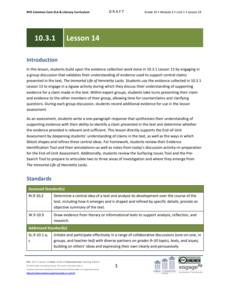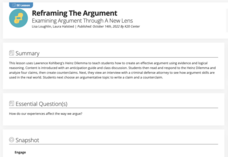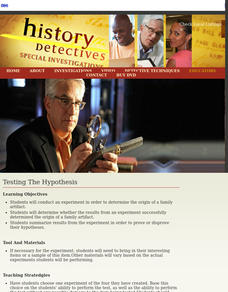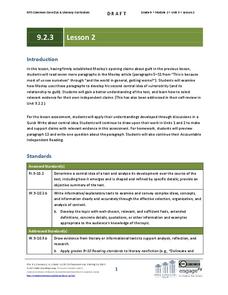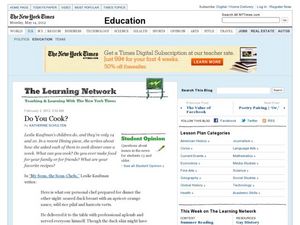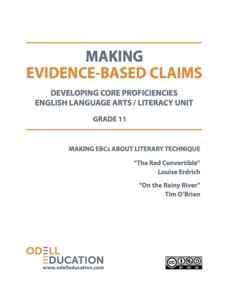EngageNY
Research: Close Read of Text 2 for Each Expert Group
Pass the chalk! Pupils participate in a Chalk Talk activity to synthesize information from multiple texts about Roberto Clemente and Althea Gibson. Scholars also read an informational article about one of the athletes, searching for...
EngageNY
Grade 10 ELA Module 3: Unit 1, Lesson 14
Do you have a valid claim? Learners become judges of claims as they expand on evidence collected in lesson 13 and develop claims. They present claims to one another and respond to questions and counterclaims. To finish, individuals...
K20 LEARN
Reframing the Argument: Examining Argument through a New Lens
As part of a study of crafting compelling arguments, class members tackle the problem presented in Lawrence Kohlberg's "The Heinz Dilemma." After discussing the dilemma with classmates, writers draft an essay with a claim, support...
EngageNY
Grade 9 ELA Module 4, Unit 1, Lesson 24
Who bears the most responsibility for ensuring that goods are ethically produced? Using evidence drawn from Sugar Changed the World: A Story of Magic, Spice, Slavery, Freedom, and Science, the unit's central text, and from the...
EngageNY
Grade 9 ELA Module 4, Unit 1, Lesson 10
What can consumers do to pressure companies to produce "ethically manufactured goods"? Readers examine the evidence Amy Odell uses in the supplemental text "How Your Addiction to Fast Fashion Kills" to support her argument and her...
EngageNY
Finding Relevant Information and Asking Research Questions: The Benefits of Video Games
Video games may not be so bad after all. As scholars read the text "The Many Benefits, for Kids, of Playing Video Games," they summarize the gist in their researchers' notebooks. Next, pupils draft supporting research questions based on...
EngageNY
Grade 10 ELA Module 3: Unit 1, Lesson 15
It's time for the grand finale! Scholars finalize their learning in a two-part end-of-unit assessment. This assessment covers multiple standards as learners demonstrate their understanding of the central idea, comprehension, and...
EngageNY
Grade 10 ELA Module 3: Unit 2, Lesson 5
Have you ever argued for the sake of argument? Scholars dig into what makes a compelling argument. They learn to create evidence-based arguments using a teacher-led model. Once finished, they use an evidence-based checklist to guide...
EngageNY
Examples from Life Today
Does that happen in real life? Scholars look at their Themes of Adversity graphic organizers and think of examples in today's world for each type of adversity. They determine if today's world has the same struggles as those in the...
EngageNY
Grade 9 ELA Module 4, Unit 1, Lesson 19
Building on the previous discussion of the supplemental reading article "Where Sweatshops Are a Dream," class members use the provided Evaluating Argument and Evidence Tool to identify the claims and evidence Nicholas Kristof uses to...
PBS
Testing The Hypothesis
After choosing one experiment from the four they conducted in the previous lesson, young investigators analyze the evidence they collected to determine if it proves or disproves their original hypothesis.
EngageNY
Grade 9 ELA Module 1, Unit 1, Lesson 1
Word choice can drastically alter the tone of a piece of writing. Ninth graders read Karen Russell's short story "St. Lucy's Home for Girls Raised by Wolves" and use textual evidence to help them analyze how word choice affects their...
EngageNY
Grade 9 ELA Module 2, Unit 3, Lesson 2
"Everybody is guilty of something." As class members continue their close reading of Walter Mosley's essay, they examine how Mosley develops and supports his central ideas about Western civilization's relationship to guilt.
Anti-Defamation League
What Is the Dream Act and Who Are the Dreamers?
The DREAM Act (Development, Relief, and Education for Alien Minors Act) is the focus of a lesson that asks high schoolers to investigate the act's provisions and read statements by individuals who support and oppose the act. They then...
Read Works
Cats in the Catacombs
Fourth graders read a short story and then answer questions based on what they read. Learners are asked to support their answers with evidence from the text.
Curated OER
Children Cooking at Home: Developing Opinions
Excerpts from a New York Times article about children cooking dinner for their family can lead learners to express opinions about taking on real life responsibilities. The story will prompt discussion, but add more questions directed at...
EngageNY
Tracing a Speaker’s Argument: John Stossel DDT Video
Which side are you on? Scholars watch a video of John Stossel discussing the use of DDT pesticide. Learners talk about the purpose of the video and the speaker's argument and then complete a Tracing an Argument graphic organizer while...
Reading Worksheets
Inferences Worksheet 6
Have your learners mastered making inferences? Have pupils work their inferring muscles by completing this instructional activity, which includes four passages to read and analyze. Learners answer two to three questions about each...
Reading Worksheets
Inferences Worksheet 7
Hone your learners' inference-making skills with this exercise. The worksheet includes four passages that learners read and answer questions about. Pupils must note down their inferences along with textual evidence that support their...
Reading Worksheets
Inferences Worksheet 10
After reading some of your learners' work and analyzing their literary analyses, you might infer that they need some practice with making inferences! Assign this exercise to support your pupils. They read four passages and make...
K12 Reader
Traveling to the Distant West
If you build it they can come. After reading a short article about the impact of western expansion, middle schoolers cite evidence from the article to explain how this expansion forced changes in transportation.
Reading Worksheets
Inferences Worksheet 9
Help your pupils take charge of their inferring abilities with an exercise designed for direct practice with making and supporting inferences. Learners read four short passages and answer two to three questions for each passage that...
Odell Education
Making Evidence-Based Claims Literary Technique: Louise Erdrich and Tim O’Brien
Take a ride in The Red Convertible by Louise Erdrich. Students read the story and discuss whether a car is really a character. After carrying out several activities using graphic organizers and tools for making their claims in The Red...
Odell Education
Building Evidence-Based Arguments: “Doping can be that last 2 percent.”
Even the most thrilling sports career can end in an asterisk if the player uses performance-enhancing drugs. Focused on the topic of doping in sports, a seventh grade unit breaks down the arguments for and against steroids in five...



